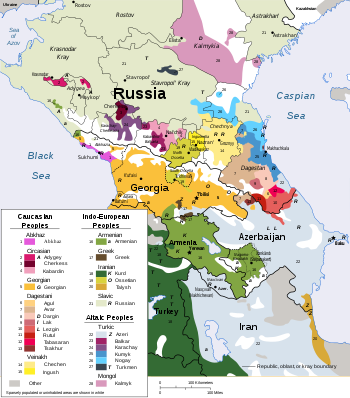Lezgic languages
The Lezgic languages are one of seven branches of the Northeast Caucasian language family. Lezgian and Tabasaran are literary languages.
| Lezgic | |
|---|---|
| Geographic distribution | Dagestan, Azerbaijan |
| Linguistic classification | Northeast Caucasian
|
| Subdivisions |
|
| Glottolog | lezg1248 (Samur)[1] arch1244 (Archi)[2] |
 Lezgic | |
The voicing of ejective consonants
The Lezgic languages are relevant to the glottalic theory of Indo-European, because several have undergone the voicing of ejectives that have been postulated but widely derided as improbable in that family. The correspondences have not been well worked out (Rutul is inconsistent in the examples), but a few examples are:
- Non-Lezgic: Avar tstsʼar; Lezgic: Rutul dur, Tsakhur do 'name'
- Non-Lezgic: Archi motʃʼor, Lak tʃʼiri; Lezgic: Rutul mitʃʼri, Tabassaran midʒir, Aɡul mudʒur 'beard'
- Non-Lezgic: Avar motsʼ; Lezgic: Tabassaran vaz 'moon'
A similar change has taken place in non-initial position in the Nakh languages.[5]
gollark: Compile it yourself.
gollark: Potentially.
gollark: There was a 2 minute window when a broken update was pushed but I doubt they were that unlucky.
gollark: Allegedly.
gollark: Screenshot or something?
References
- Hammarström, Harald; Forkel, Robert; Haspelmath, Martin, eds. (2017). "Lezgic". Glottolog 3.0. Jena, Germany: Max Planck Institute for the Science of Human History.
- Hammarström, Harald; Forkel, Robert; Haspelmath, Martin, eds. (2017). "Archi". Glottolog 3.0. Jena, Germany: Max Planck Institute for the Science of Human History.
- Ethnologue report for Archi
- Languages in the Caucasus, by Wolfgang Schulze (2009) Archived 2011-06-10 at the Wayback Machine
- Paul Fallon, 2002. The synchronic and diachronic phonology of ejectives, p 245.
This article is issued from Wikipedia. The text is licensed under Creative Commons - Attribution - Sharealike. Additional terms may apply for the media files.
